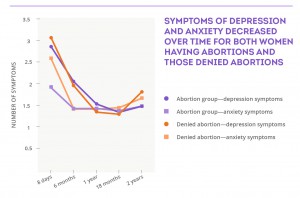New Turnaway Study publications find no evidence of widespread “post-abortion trauma syndrome,” often cited by abortion opponents as a harmful mental health consequence of abortion.
 View the infographic.
View the infographic.
"Decision Rightness and Emotional Responses to Abortion in the United States: a Longitudinal Study" was e-published on July 8, 2015 in the journal PLOS ONE. The publication is free to download. Summary: In this study, the authors found that, when women who had abortions were asked if they thought having an abortion was the right decision for them, 95% said it was. This was true both immediately after the abortion and over 3 years later. For women who had abortions, positive emotions, including relief and happiness, outweighed negative emotions. The study asked women about four negative emotions – regret, sadness, anger and guilt. There were no significant differences in women’s emotions about the abortion, or in their belief that abortion was the right decision, between women having abortions in the first trimester and those having later abortions. This finding challenges the common assumption that later abortion is more emotionally difficult. Further, the intensity of all emotions decreased for both groups of women as they stopped thinking about the abortion over time. "A comparison of depression and anxiety symptom trajectories between women who had an abortion and women denied one" was published in the July issue of the journal Psychological Medicine. Read the full publication (requires subscription). Summary: The study found that anxiety is elevated among women who have been denied an abortion and are still trying to end their pregnancy. But over time, both women who have abortions and women who carry unwanted pregnancies to term have similar, and decreasing, rates of anxiety and depression. There do not appear to be mental health problems caused by abortion.
